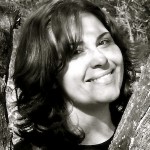Archive for the ‘lara dunston’ Category
Winners of Travellers Calabria Guidebook & Calabrian CD by Marasà
I know you’re anxious, but for those who may not have seen all the great things leading up to today’s announcement, do check out the rest of the week’s posts:
- Kicking Off Travellers Calabria Week with Mimmo’s Music
- Q&A with Travel Writer Lara Dunston Part 1
- Part 2 of 5
- Part 3 of 5
- Part 4 of 5
- Part 5 of 5
Now let’s get to it!
The winner of the Calabrian CD by Marasà is Victor Cina aka @victorcina on Twitter (a great person to follow by the way)!
And the five winners of Travellers Calabria guidebooks are:
- Bonnie (Valentino’s Wife) of Amore e Sapore di Famiglia
- Ice Tea for Me
- Suzie of Palazzo Pizzo
- Sezzy
- Jo Tedesco of Santa Cristina D’Aspromonte
Most of these winners entered several times, including tweets and FB postings, so it does pay to be persistent! I will email all of you for your details, but if for some reason you don’t hear from me, feel free to send along your mailing address through Twitter, FB, or email michellefabio5(at)gmail(dot)com.
For those of you who would still like a copy of Travellers Calabria (as well you should!), you can purchase one via this special link through which I would get a small commission:

Thanks so much to everyone who read and commented and especially to Lara Dunston and Terry Carter not only for writing a fabulous guidebook about Calabria but also for being so available to talk about it and the business of travel writing.
Buon weekend a tutti!
Travellers Calabria Contest: Q and A with Travel Writer Lara Dunston Part 5 of 5
 Welcome to the final day of our Q and A with Travel Writer Lara Dunston! Previous installments:
Welcome to the final day of our Q and A with Travel Writer Lara Dunston! Previous installments:
Remember that I’m giving away FIVE copies of Lara and Terry Carter’s new guidebook, Travellers Calabria. See details here, but essentially you can comment every day this week for a chance to win Lara and Terry’s book.
And don’t forget to go back and comment on Sunday’s post for a chance to win a Calabrian CD by the group Marasà.
Hurry, today’s your last chance to comment on all the posts!
Now, the final part of my interview with Lara (all photos provided by Lara and Terry; remember you can hover over the photos for their descriptions):
9. Can you share some advice for aspiring travel writers?
Learn to write, learn to travel, and learn about people and places – these are the most important things.
Skills and qualities that come in handy are organizational abilities, especially trip planning, scheduling, budgeting and creating itineraries – you have to think of what you’re doing as a small business otherwise you’ll never be successful, time is money and all that; research skills, of course; language skills or an ability to mime and a mimic accents at least (!); and people skills, especially skills of diplomacy, because while most people you’ll deal with, especially those in hospitality, are absolutely delightful, you will meet the occasional jerk (trust me!).
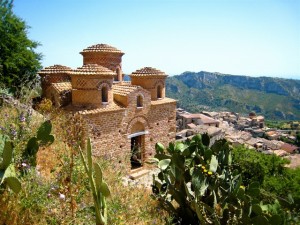 The most important qualities a writer needs to develop, however, is what I call skills of discernment, that is, the ability to judge whether a meal or restaurant is good or bad or why one hotel is better than another. This has nothing to do with taste, that is whether you like a place or not, but it has to do with form and function and all the many elements that comprise them, and you need to consider these things very objectively and critically.
The most important qualities a writer needs to develop, however, is what I call skills of discernment, that is, the ability to judge whether a meal or restaurant is good or bad or why one hotel is better than another. This has nothing to do with taste, that is whether you like a place or not, but it has to do with form and function and all the many elements that comprise them, and you need to consider these things very objectively and critically.
And then – yes, there’s more! – there’s a tonne of knowledge writers need to develop in all sorts of areas, from the travel industry and airlines and hotel companies, to transport and telecommunications and health and weather, to history and politics, arts and culture, archaeology and anthropology, food and wine, fashion and music, you name it!
You need to read as much as you can about a place before you go, while you’re there, and when you’re writing up, and that’s why research skills are so important.
I always encourage writers to hone their writing skills by using other quality pieces of writing as models to aspire to, whether it’s a longer magazine narrative piece or a guidebook you really liked. They should always keep the reader in mind – don’t write for yourself (so forget the corny jokes) but think about what it is that your reader wants from this text, do they want to be inspired, do they just want practical information? Some books require both.
You also need to learn to pitch, because it’s the pitches that get you the writing commissions in the first place. And there are certain etiquettes and protocols to learn, such as keeping in mind that editors, especially magazine editors, are very busy people, so take care when writing your pitches, don’t waste their time, think about what it is that they might need to know to make a decision as to whether they’re going to give you a story or not.
Develop a relationship and stay in touch but try not to be a pain in the butt by annoying them too much. Although to be honest, I often wonder how busy some editors really are, especially when on a Friday afternoon I get an email that ends with “have a good weekend” because they’re at least going to have a weekend – I’m not!
In this economic climate, I wouldn’t advise any aspiring writer to do what we did and quit their jobs and take to the road. It’s a tough time for the media and publishing industries, as it is for everyone.
 Terry and I no longer have a year’s worth of work lined up as we did for a few years running.Guidebook publishers are “slowing” their schedules, and books that aren’t bestsellers are getting “postponed”. Fees are also declining. Magazines and newspapers are cutting their freelance budgets, so that means they’re buying less content from writers who are in the field and more editors are writing stories researched from the desk.
Terry and I no longer have a year’s worth of work lined up as we did for a few years running.Guidebook publishers are “slowing” their schedules, and books that aren’t bestsellers are getting “postponed”. Fees are also declining. Magazines and newspapers are cutting their freelance budgets, so that means they’re buying less content from writers who are in the field and more editors are writing stories researched from the desk.
My advice would be to start to develop your portfolio while you have a more secure job or are freelancing in a more lucrative area, and don’t take the leap into full-time freelancing just yet, not until you have a portfolio of clips and you are on a roll and the offers are coming in.
On the other hand, I think there are a lot of opportunities in the digital feed, but unfortunately most simply don’t pay well enough, some pay well below the industry rate, and I don’t think anyone should be writing a thousand word story for $50!
10. What’s up next for you?
We’re in Mallorca now. I’m updating a book for AA Publishing and Terry has a huge photography contract, shooting pics for a few of AA’s Mallorca books. We’re hoping to take a couple of weeks off to spend in Barcelona and Madrid, two of our favorite cities in the world, and yet we’ve just realized we haven’t visited them in about six years!
Then we head to London for a few days, the Veneto for a few days, then Dubai, Syria for a magazine story and meetings about a book, then Thailand to do a book.
We’re currently developing a few books with a publisher on the UAE and Syria that we’re hoping will come off but it’s hard to get projects off the ground in this climate, so we’ll have to see where the work takes us next….
Well we can’t wait to follow you two.
Thanks so much for sharing such valuable information and insights with us, Lara!
Remember you can keep up with Lara on Twitter @laradunston and at her blog, Cool Travel Guide; Terry can be found @terencecarter on Twitter and at his blog Wide angles, wine and wanderlust.
Be sure to leave your comment and tweet or post to Facebook to maximize your chances of winning a copy of Travellers Calabria! See contest details here. Ends tonight!
Travellers Calabria Contest: Q and A with Travel Writer Lara Dunston Part 4 of 5
 Welcome to Day 4 of our Q and A with Travel Writer Lara Dunston! Previous installments:
Welcome to Day 4 of our Q and A with Travel Writer Lara Dunston! Previous installments:
Remember that I’m giving away FIVE copies of Lara and Terry Carter’s new guidebook, Travellers Calabria. See details here, but essentially you can comment every day this week for a chance to win Lara and Terry’s book.
And don’t forget to go back and comment on Sunday’s post for a chance to win a Calabrian CD by the group Marasà.
Now, my interview with Lara continues (all photos provided by Lara and Terry; remember you can hover over the photos for their descriptions):
7. Please help us live vicariously through you and walk us through your writing and research process for a guidebook.
If it’s a guidebook update, then the first thing we do is create an itinerary based on the content of the book.
If it’s a city guide and we’re renting an apartment in a city then we have to determine how we’re going to spend our days and nights for the next month or two so that we’re experiencing as many of the museums, sights, hotels, restaurants, bars, cafes etc as we can in the time available to do the research.
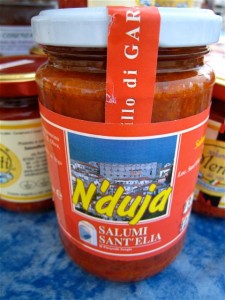 If it’s a country and regional guide, then we create an itinerary that gets us to those places in the most logical way.
If it’s a country and regional guide, then we create an itinerary that gets us to those places in the most logical way.
If they’re small towns we might only have enough time to spend a day and night. If they’re small cities obviously we try to stay longer, two or three days.
For big cities, we might stay weeks. For a city guide we might spend a month or two in that city. For the Australia book we recently did we were on the road for 5.5 months, and that was just the research part!
We always try to do everything and we do as much as we can – and we will phone places we can’t visit or places that are closed due to the season or they’re being renovated or whatever. Publishers simply don’t pay writers enough money to allow them sufficient time to do absolutely everything unfortunately.
When we’re doing the actual update of a book, we’re checking the accuracy of the existing text, of its practicalities, its facts and its overall description. We’re constantly asking ourselves if the place we’re visiting or thing we’re experiencing looks and feels the way it was described, and we’re changing the text accordingly.
We’re also assessing whether places are worth keeping in, and if they’re not and we’re planning to remove them, then we’re looking for new places to put in.
Writing first edition books are much harder of course – and the Calabria book was a first edition – because you’re gathering as much information as you can from a whole variety of sources and bringing that all together. You’re visiting places, writing down your observations, talking to people, writing notes, taking photos, and then sitting down and looking at all your research material and writing the whole book from scratch.
When I’m writing, I’m constantly referring to my notebooks and my photos (my photo galleries are essentially my memory!), but I’m also emailing people to ask extra questions I didn’t have time to at the time, I’m consulting history books, books on the politics and society of a place, or books written by locals that I might have picked up on the road.
I’m double-checking details on hotel and tourism websites, if it’s a place we might have had a few doubts about then I’m also looking at other reviews to find out what other people’s experience was – but we have enough experience now to know whether a hotel or restaurant was having a bad day or whether they have serious problems.
 Once we submit the manuscript then the editing process I touched on above begins and the editor sends back AQs (author queries). Some book publishers, such as DK, (as well as some magazines) also take the text through a further stage, the fact-checking process, as well, so you might have questions that also come from a fact-checker as well as the editor.
Once we submit the manuscript then the editing process I touched on above begins and the editor sends back AQs (author queries). Some book publishers, such as DK, (as well as some magazines) also take the text through a further stage, the fact-checking process, as well, so you might have questions that also come from a fact-checker as well as the editor.
8. What were your best and worst travel writing experiences?
The best far outweigh the worst, that’s for sure. They include any book we’ve written on Italy – and we’ve written books on various regions of Italy for Footprint, Thomas Cook and Lonely Planet – simply because we love Italy so much.
Other books that were great fun to research were the Buenos Aires guidebook we did for LP (we rented an apartment there for over two months and fell deeply in love with the city, so much so that we’re planning to buy an apartment there – we just need to find the time to get down there to do that!), and also books for LP on Amsterdam, and on Brussels Bruges Antwerp and Ghent. They were also cities we had been to and knew, but we really became very intimate with them writing books.
We spent a month in Thailand updating a book for DK and as I had to write a new spread on spas we got to try out an awful lot of spa treatments – so how can you complain about that?
I can’t recall a book experience being bad because of the place, but rather because of the circumstances. For instance, when editors send you to research books in Europe in summer – which they always seem to do – it’s the worst time because it’s not only expensive and hard to get rooms but it’s so hot that it’s doubly-exhausting running around checking stuff out.
Doing books on the road in Australia can be hard because of the poor telecommunications – so many motels in outback towns don’t have internet access or if they do, it’s dial-up, which we can’t use without accounts (we haven’t lived in Australia for 11 years).
While every town in Australia has phone access, once you’re out of those towns, there’s no signal, so you can’t use your mobile phone for many hours on the road when you could be making calls to check stuff, and that’s very frustrating.
In Australia, which is where we wrote our last books, we also had problems associated with horrific weather, we got caught in floods in Alice Springs, hurricane-like winds in southern Western Australia, heatwaves in South Australia, and bushfires in Victoria… all of these things delay research, which delays the amount of time you spend on the book, and the longer you work on the book, the less money you ultimately make in the long run.
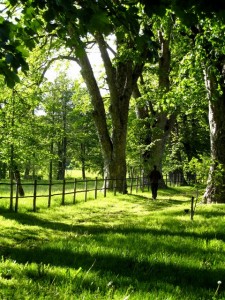 And some editors have no concept of how long it takes to research a place – they don’t add up the miles and think things through. I remember asking one editor how long the writer took to research a chapter and she told me – well, it took us twice as long, and we were often driving between 500-700 kms a day! It would have been physically impossible to do it in the amount of time the previous writer did it – they obviously skipped a lot of places!
And some editors have no concept of how long it takes to research a place – they don’t add up the miles and think things through. I remember asking one editor how long the writer took to research a chapter and she told me – well, it took us twice as long, and we were often driving between 500-700 kms a day! It would have been physically impossible to do it in the amount of time the previous writer did it – they obviously skipped a lot of places!
Probably the worst experience for me was Greece for Lonely Planet, and not at all because of Greece – or Lonely Planet – but we were in Thessaloniki and we were just about to pick up a hire car to embark on a six week research trip around the mainland and Peloponnese when my sister called from Australia to say my mum had been hit by a car and was in a critical condition and in a coma.
Terry immediately contacted Lonely Planet and they were understanding and said go and take as long as we needed. We were very lucky and we were able to get on flights from Thessaloniki to Athens that morning, then Athens to Dubai in the afternoon, then Dubai to Perth the next day, and I was in intensive care with my mother 24 hours later. Once my mother was out of danger, albeit still in a coma, a couple of weeks later, we were driving around Greece updating the book.
That was the hardest book I’d ever had to do because I was constantly thinking about her, but at the same time we couldn’t let LP down, especially as they’d been so understanding, and Terry couldn’t do it on his own. My Mum ended up being okay, although she lost an eye and most of the use of an arm and still has difficulty walking, and had she have died while I was driving around Greece, I probably would have died.
Something aspiring writers need to keep in mind is that the most difficult thing about being a freelancer is that you don’t get sick leave, annual leave or compassionate leave, and you don’t always have sympathetic publishers.
We wrote and updated 25 books for Lonely Planet and while I am no great fan of theirs, especially now that they’re largely much owned by the BBC, they were very understanding and could be very good about how they treated their writers when it came to things like that.
That can’t be said about all publishers so writers need to carefully pick and choose who they want to work with, but of course you can’t know until you’ve worked for them. And I’m sure some publishers feel the same about writers!
How cool is this inside look into travel writing?
Be sure to come back tomorrow for the final installment, which will include Lara’s excellent advie to all you aspiring travel writers out there.
Be sure to leave your comment and tweet or post to Facebook to maximize your chances of winning a copy of Travellers Calabria! See contest details here.
Travellers Calabria Contest: Q and A with Travel Writer Lara Dunston Part 3 of 5
 Welcome to Day 3 of our Q and A with Travel Writer Lara Dunston! Previous installments:
Welcome to Day 3 of our Q and A with Travel Writer Lara Dunston! Previous installments:
Remember that I’m giving away FIVE copies of Lara and Terry Carter’s new guidebook, Travellers Calabria. See details here, but essentially you can comment every day this week for a chance to win Lara and Terry’s book.
And don’t forget to go back and comment on Sunday’s post for a chance to win a Calabrian CD by the group Marasà.
Now, my interview with Lara continues (all photos provided by Lara and Terry). Are you paying attention aspiring travel writers?
5. Turning to your writing career, how did you get into travel writing?
I actually started out studying film production and cinema studies in Sydney, Australia, in the mid- to late-80s, and worked in media relations/PR to put myself through university. I made films, wrote film reviews for many years, and taught film – a combination of industry courses and film appreciation type courses for adult learners.
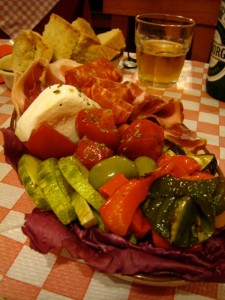 My greatest passions had always been film and travel, and after years of making short films, and then two years making my first feature film (which almost killed me), I started to re-think what I wanted to do.
My greatest passions had always been film and travel, and after years of making short films, and then two years making my first feature film (which almost killed me), I started to re-think what I wanted to do.
I left my job, focused on freelancing, writing about film and teaching film mainly, but I also did a travel writing and photography course, and then a couple of tiny travel pieces for a publishing company Terry worked for, which at the time was Australia’s largest publisher of maps, street directories, caravan and camping books. They offered us our first guidebook, the Sydneyside guide, which was Terry’s idea, and it became part of their compact street directories and still exists actually.
Yet despite that fantastic opportunity, I didn’t really get into travel writing then… I wrote a teen fiction novel, continued to write film reviews, and I stuck with film for a long time after.
I did a full-time Masters degree which took me to South America for the second year of the program to research Latin American cinema (my itinerary was dictated by the film festival calendar) and then returned to Australia to write my thesis, saw a job teaching media studies, film and writing at a women’s university in Abu Dhabi, applied, got it, and we moved to the UAE in 1998.
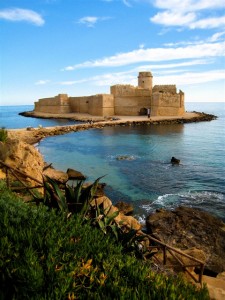 It was while we were there that we accidentally fell into travel writing again – we’d used a couple of dreadful Lonely Planet books; they were current editions but they were terribly out of date, and they really impacted the trip we did and the choices we made. I was complaining about them to my friend’s sister who was in the UAE on holidays who worked for Lonely Planet.
It was while we were there that we accidentally fell into travel writing again – we’d used a couple of dreadful Lonely Planet books; they were current editions but they were terribly out of date, and they really impacted the trip we did and the choices we made. I was complaining about them to my friend’s sister who was in the UAE on holidays who worked for Lonely Planet.
She suggested we let LP know and forward in some notes and get some free books. So I did and they asked us if we’d be interested in writing for them. We wrote a sample, got approved, was offered the Dubai guide to update, then Syria and Lebanon, and that’s how it all started…
The first book we did was during our summer vacation (I used to get two months off every summer, and a couple of weeks for winter, plus lots of Islamic holidays!) and I was considering leaving my job at the time, so we took on more writing work. But then out of the blue came a promotion to run the media department at the women’s campus for the same institution in Dubai. I’d been teaching at a tertiary level for 5 years then, so it was a great opportunity, so I took it.
So Terry, who’d been working as a multimedia designer suddenly found himself virtually working as a full-time travel writer, and he did the bulk of quite a number of books with me just writing chapters on shopping and entertainment, some of the sights, and other fun bits and pieces, as well as editing for him.
Two and a half years later I was ready to leave my job and – as we had a lot of writing offers, a whole year’s worth of books in fact – we decided that I would quit my job, we would put all our worldly possessions in storage in Dubai, and we would travel for a year as an experiment to see if we could live out of our suitcases, make a success of travel writing, and survive as a couple, and then we’d settle down and write a book about the experience. The problem was we kept getting all these enticing offers to travel to interesting places, so three and a half year’s later, we’re still on the road…
6. What are your favorite and least favorite parts of the job?
The research is definitely my favorite bit. It’s exhausting, because you work seven days a week and generally work 14 hour days on a good day, often longer, especially if you’re doing a city guide and you have to stay up late to check out bars and clubs then get up early to check out markets, then museums and shops, then restaurants… it doesn’t stop.
But I love being on the road and travelling around and exploring a country or region, and if it’s one you know but you don’t know intimately, then that chance to fully discover it and become familiar with it and make friends with locals is just so rewarding.
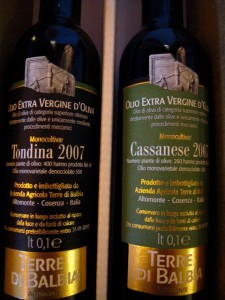 When you’ve done that so many times in so many countries – we’ve travelled to 60 countries now – you really become so attached to places that they all feel like your second homes, and you do feel like a citizen of the world. I love that feeling.
When you’ve done that so many times in so many countries – we’ve travelled to 60 countries now – you really become so attached to places that they all feel like your second homes, and you do feel like a citizen of the world. I love that feeling.
A downside, however, is that unlike an expat of one country, who might keep up with the news in their new home as well as their country of birth, I find myself – no matter where we are – constantly checking up on what’s going on in Italy, Syria, Lebanon, Argentina, Thailand, the UAE, and of course, my place of birth Australia. Sometimes I feel like I’m suffering from global information overload!
I also love the writing, although that stage is completely different to the research, because when you’re researching you’re constantly mobile, whereas when you’re writing you’re sedentary, chained to a desk for months and you’re working the same kind of hours seven days a week.
But when you’re writing – whether it’s a magazine story or a guidebook, you’re re-living the experience, and you’re trying to write in such a way that inspires readers to go there, while honestly evoking the place for them.
It can be a challenge because nobody wants to write negatively about anything (our job is to sell destinations and therefore help sell guidebooks or magazines after all) but at the same time nowhere is perfect and you don’t want people to build expectations and then be disappointed, so we’re always honest in our writing.
My least favorite part of the job is the editing process. That’s the only part of the job that isn’t always enjoyable. It’s totally dependent on who you’re working with. There are some editors I absolutely love working with and some publishing companies seem to have better editors than others, perhaps because they pay them more.
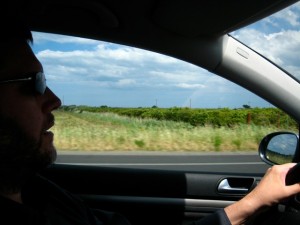 The good editors are intelligent editors who ask smart questions – they tend to be widely travelled and yet they understand the brand of the book and the needs of a reader and what they want from the text, but they also understand the needs of the writer and appreciate when they might be on the road and can’t access the internet, that they might be rocking up to a hotel at 9pm, eating at 10pm, then crashing, only to have to get up at 6am and hit the road again, so they know you might not be able to turn text or enquiries around fast.
The good editors are intelligent editors who ask smart questions – they tend to be widely travelled and yet they understand the brand of the book and the needs of a reader and what they want from the text, but they also understand the needs of the writer and appreciate when they might be on the road and can’t access the internet, that they might be rocking up to a hotel at 9pm, eating at 10pm, then crashing, only to have to get up at 6am and hit the road again, so they know you might not be able to turn text or enquiries around fast.
They also know that you’ve slaved away doing research on the road for this book for months – and if you actually divided the fee by the number of hours actually worked, it doesn’t seem so generous after all, that we’ve actually worked for a pittance – and some editors respect this and are more sensitive about the questions they ask.
Fortunately we’ve worked with a lot of great editors, especially at DK, also AA Publishing, and some Lonely Planet editors were great.
But we’ve also worked with some bad editors. The worst kind of editor is the one that is ignorant about the place, hasn’t travelled much, and asks pointless questions. Some seem to be justifying their jobs by making changes for the sake of change – it can be especially frustrating when they insert errors or change the text so that it’s wrong.
I’m not so concerned about my own writing, I got over being precious about my writing a long time ago – but I ask myself what makes the most sense to the reader, what’s going to help the reader out most, and if I think it still makes sense to the reader, I let the change slide, if it doesn’t, then I’ll argue it.
But once you do that, things always become unpleasant, the writer is perceived as being a pain-in-the-butt, and you probably won’t work with that editor, or get a job from the commissioning editor again.
Thanks so much for this inside look into life as a travel writer, Lara. Readers, stay tuned for more Q and A tomorrow!
Be sure to leave your comment and tweet or post to Facebook to maximize your chances of winning a copy of Travellers Calabria! See contest details here.
Travellers Calabria Contest: Q and A with Travel Writer Lara Dunston Part 2 of 5
 Welcome to Day 2 of our Q and A with Travel Writer Lara Dunston! See the first part of the interview here.
Welcome to Day 2 of our Q and A with Travel Writer Lara Dunston! See the first part of the interview here.
Remember that I’m giving away FIVE copies of Lara and Terry Carter’s new guidebook, Travellers Calabria. See details here, but essentially you can comment every day this week for a chance to win Lara and Terry’s book.
And don’t forget to go back and comment on Sunday’s post for a chance to win a Calabrian CD by the group Marasà.
Now, my interview with Lara continues (all photos provided by Lara and Terry):
3. Obviously you’re an expert traveler. Tell us a bit about how you pack, e.g., how long does it take, what are the “must” pack items?
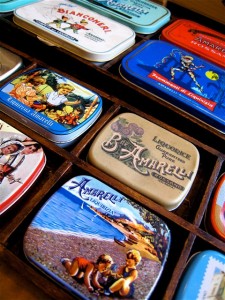 I’m actually the last person to ask about packing because while I do apply good techniques – rolling clothes tightly, separating clothes onto one side of my Samsonite and everything else (shoes, toiletries, cosmetics, books etc) on to the other – I am not travelling for holidays so our needs are very different to someone going to Paris for a week or backpacking around Europe for a few months.
I’m actually the last person to ask about packing because while I do apply good techniques – rolling clothes tightly, separating clothes onto one side of my Samsonite and everything else (shoes, toiletries, cosmetics, books etc) on to the other – I am not travelling for holidays so our needs are very different to someone going to Paris for a week or backpacking around Europe for a few months.
Terry and I quite literally live out of our suitcases – we’ve been on the road for 3.5 years now, bouncing around the planet from one commission to another. So our bags are our homes and we travel with everything we need to be able to set up and work wherever we are.
Therefore we have a lot of technology, laptops, cameras, collections of adaptors and cables, and Terry has dozens of drives with his photos on them. I also carry around things the average traveler wouldn’t, like a collection of DVDs of favorite movies and TV shows that we watch during down time when we want to stay in of an evening and pretend to be normal.
I’m also a last minute packer. I never allow more than a few hours to pack. I’ve done it so many times, that there’s really nothing to think about. The only time I might pack 24 hours before, and then re-pack at the last minute (discarding non-essentials), is if we’ve been in one place for a while and have gathered lots of stuff, especially research materials.
But we have an attitude that if we forget something we just buy it, and if we have too much gear we send it to my sister’s or aunt and uncle’s, who both have big houses and they store it for us.
4. I’m a firm believer that voracious reading greatly benefits writers; who are your favorite travel writers?
I totally agree with you but as a busy working travel writer, I actually have little time to read anything that doesn’t relate to the place I’m researching. I used to read far more travel literature before I became a travel writer. Then my favorite writers were people like Paul Theroux, Robert Kaplan, Freya Stark, and Jan Morris.
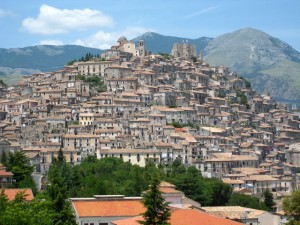 Now, what we usually do is buy literature by writers who have written about the places we’re travelling in, so for instance, we read Laurence Durrell’s “Bitter Lemons of Cyprus” while in Cyprus last year. Or we pick up stuff by local writers.
Now, what we usually do is buy literature by writers who have written about the places we’re travelling in, so for instance, we read Laurence Durrell’s “Bitter Lemons of Cyprus” while in Cyprus last year. Or we pick up stuff by local writers.
We’re in Mallorca at the moment, so I have George Sand’s “Winter in Majorca” by my bedside, and I’m trying to get hold of the books written by the children of Robert Graves, the English poet and novelist who lived here for much of his life, who still live in Mallorca apparently.
One book that I always travel with, however, is Alain de Botton’s “Art of Travel” because I’m really interested in why people travel, their motivations, inspirations and expectations, and what they get out of travel (I actually started a PhD on the connections between film and travel many years ago) and so I dip into that book every now and again and it constantly helps me to think about travel in new ways and deepens my understanding about what we do.
More *fabulous* answers! Thanks so much Lara!
Come back tomorrow for more with Lara as she shares what life as a travel writer is *really* like–you aspiring travel writers will especially appreciate her thoughts!
Be sure to leave your comment and tweet or post to Facebook to maximize your chances of winning a copy of Travellers Calabria! See contest details here.

